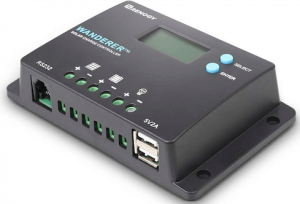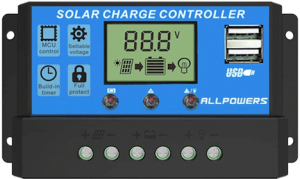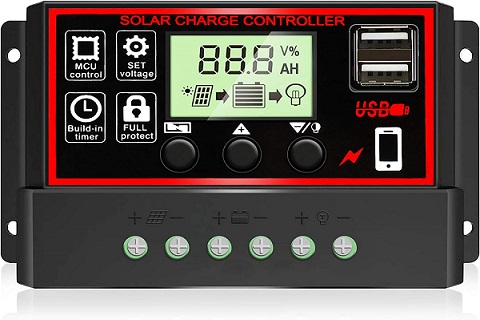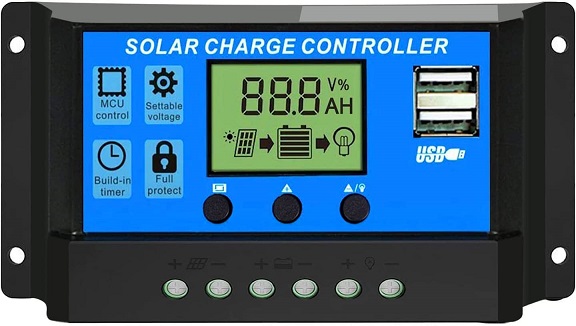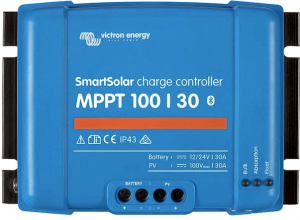Solar charge controllers act as the gatekeeper between solar panels and batteries. They regulate the voltage and current from the panels to prevent batteries from overcharging, thereby extending battery life and ensuring system efficiency.
To make your purchase worthwhile and best suitable for your solar panel, select the controller by considering these key factors…
- Voltage Rating: Select a controller compatible with your system’s voltage. Most controllers fit 12V or 24V setups, ensuring they work well with your solar panels and batteries.
- Maximum Current: Solar charge controllers vary in their current ratings, with some supporting up to 20A and others up to 40A for larger systems.
- Compatible Battery: Ensure the solar charge controller is compatible with your specific battery type, whether it’s lead-acid, lithium, or others, to optimize performance and longevity.
Best Solar Charge Controllers Table
| Solar Charge Controllers | Maximum Current | Voltage Rating | Warranty | Buy Now |
|---|---|---|---|---|
| Renogy Solar Charge Controller | 10 amps | 12 volt, 24 volt | - | Check On Amazon |
| Allpowers Solar Charger Controller | 20 amps | 12 volt, 24 volt | 1.5 year long | Check On Amazon |
| Depvko Solar Charger Controller | 30 amps | 12 volt, 24 volt | 1 year long | Check On Amazon |
| EEEkit Solar Charge Controller | 30 amps | 12 volt, 24 volt | 1 year long | Check On Amazon |
| Victron Solar Charge Controller | 30 amps | 12 volt, 24 volt | 3 year long | Check On Amazon |
| SUNYIMA Solar Charge Controller | 60 amps | 12 volt, 24 volt | -- | Check On Amazon |
Best Solar Charge Controllers Reviews
1. Renogy Solar Charge Controller
Even though there are many brands of solar charge controllers out there, Renogy is one of the most popular ones since it is able to offer various handy features at a low price tag.
The Renogy Wanderer Solar Charge Controller is the 1st product in this article and it is one of the cheapest options out there, which comes with a Bluetooth module. Thanks to its Bluetooth module, you can easily monitor your solar panel configuration. Although, its maximum current rating is quite low at just 10A.
Thankfully, this budget-oriented solar charge controller can still be a great option for many, as it supports both 12V and 24V solar systems (panels and batteries). A great thing about this solar charge controller is that it also has inbuilt USB ports for charging your mobile devices quite easily. Unfortunately, as it is a budget solar charge controller, you do not get any warranty with it.
Highlights
- Offers a maximum current rating of 10A
- Works with both 12V and 24V solar panels
- Inbuilt 5V 2A USB ports
Pros
- Budget-friendly solar charge controller
- Comes with an inbuilt Bluetooth module
- Offers two USB ports for charging mobile devices
Cons
- Not the most powerful solar charge controllers
2. Allpowers Solar Charger Controller
In case that you are on a budget, then you should consider going with the Allpowers solar charge controller as its products are known to offer various handy features to the user.
This Allpowers Solar Charge Controller is the 3rd product in this article and it is one of the cheapest options out there. Despite having a low price tag, it comes with an inbuilt display, which can be useful for checking info related to your solar panels. You also get a decent maximum current rating of 20A with this one.
To make sure that you can use this solar charge controller with almost any solar panel of your choice, Allpowers has support for both 12V and 24V systems. Even though this solar charge controller offers a pretty good warranty period of 1.5 years, its build quality is quite average, which might be an issue for some.
Highlights
- Offers a maximum current rating of 20A
- Works with both 12V and 24V solar panels
- Comes with a 1.5-year long warranty
Pros
- Affordable solar charge controller
- Includes an inbuilt display
- Comes with a long warranty period
Cons
- Average build quality solar charge controller
3. Depvko Solar Charger Controller
Those of you who are interested in getting a high-performance solar controller can consider Depvko and its products because they offer excellent performance and various features to the user.
This is our upgraded solar panel controller – the perfect solution for managing solar panels and batteries in 12V/24V solar systems. With a built-in industrial microcontroller, it automatically regulates the charging process and memorizes various parameters set by the user. It features dual USB outputs for charging mobile devices and is equipped with overcurrent, short-circuit, inverse connection, low voltage, and overcharge protection for safety.
The LCD display shows the status and data, and it’s suitable for use in various places like home, industrial, commercial, etc. Our controller comes with a 12-month warranty and lifetime technical support. It’s only suitable for lead-acid batteries and has 3-stage PWM charge management and dual MOSFET reverse current protection, which prolongs battery life and improves system efficiency. Upgrade to our new version today and enjoy worry-free solar power management.
Highlights
- Built-in industrial microcontroller for automatic management of solar panels and batteries
- Dual USB outputs for charging mobile devices
- Overcurrent, short-circuit, inverse connection, low voltage, and overcharge protection for safety
- LCD display for status and data
- Suitable for use in various places
- 12-month warranty and lifetime technical support
- 3-stage PWM charge management and dual MOSFET reverse current protection for prolonging battery life and improving system efficiency
Pros
- Easy to use and suitable for small solar energy systems
- Safe to use with various protection features
- Automatic management with built-in microcontroller
- Prolongs battery life and improves system efficiency
Cons
- Only suitable for lead-acid batteries
4. EEEkit Solar Charge Controller
You can also consider EEEkit and its solar products if you happen to be in the market for a new solar charge controller that can offer decent performance at a low price tag.
It has 30A Solar Charge Controller with latest solar charge controller boasts a 30A rated discharge current, making it compatible with 12V or 24V systems and multiple lead-acid battery types. The dual USB 5V/3A output ports make it convenient for charging mobile devices.
The controller offers reliable protection against over-current, short-circuits, inverse connection, and low voltage. With an industrial microcontroller and functional LCD display, it provides intelligent management and easy monitoring. Installation and setup are made simple with a one-button operation and clear instructions.
We stand behind our product with a 30-day money-back guarantee and 12-month warranty for quality-related issues. Invest in our solar charge controller for efficient and trustworthy solar system management.
Highlights
- 30A rated discharge current for compatibility with 12V or 24V systems and multiple lead-acid battery types
- Dual USB 5V/3A output ports for convenient mobile device charging
- Reliable protection against over-current, short-circuits, inverse connection, low voltage, and overcharge
- Industrial microcontroller and functional LCD display for intelligent management and easy monitoring
- One-button operation for simple installation and configuration adjustments
- 30-day money-back guarantee and 12-month warranty for quality-related issues
Pros
- Provides efficient and reliable solar system management
- Easy to install and use
- Offers multiple protection functions to prolong battery life
- Compatible with various lead-acid battery types and mobile devices
- Includes industrial microcontroller for automatic management and data memory
Cons
- May not be suitable for larger solar systems or more complex setups
5. Victron Energy Solar Charge Controller
Despite being a premium brand of solar charge controllers, Victron Energy and its products can be a great option for many because of their high reliability while offering various features.
The Victron Energy SmartSolar MPPT Solar Charge Controller is the 2nd product in this article and it is the most reliable option present in this article. Not only that, but it also happens to offer Bluetooth connectivity just like the previous one. But unlike the previous one, this one also offers a very high maximum current rating of 30A.
This current rating is combined along with a voltage rating of 12V or 24V, which allows you to use this solar charge controller with virtually any solar panel. Coming to the best feature about this solar charge controller is that it offers an excellent build quality along with a 3-year long warranty, which is to be expected at its premium price tag.
Highlights
- Offers a maximum current rating of 30A
- Works with both 12V and 24V solar panels
- Comes with a 3-year long warranty
Pros
- Highly reliable and durable solar charge controller
- Comes with an inbuilt Bluetooth module
- Offers a pretty high maximum current rating
Cons
- Quite an expensive solar charge controller
6. SUNYIMA Solar Charge Controller
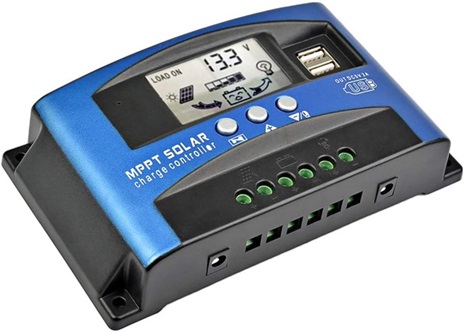
The SUNYIMA controller lets you choose how much power you use in a few different ways. It is easy to do with the screen that shows everything on it. This controller gives you clear and detailed information about its performance. It protects against too much power, short circuits, overloading and making sure the battery doesn’t get too full or too empty. It runs smoothly and it is safe for you.
Highlights
- Offers a maximum current rating of 60A
- Works with both 12V and 24V solar panels
- High efficiency (up to 99%) MPPT technology.
Pros
- Dual USB ports for convenient device charging.
- Multiple load control modes for customizable energy management.
- Comprehensive protection features against overvoltage, short circuit, overload, and overcharge/discharge.
- Easy navigation with a multi-function LCD display.
Cons
- Batteries not included, requiring separate purchase.
Guide To Buying The Ideal Solar Charge Controllers
As solar energy continues to gain traction as a viable, eco-friendly, affordable, and sustainable power source, the demand for efficient solar charge controllers has surged. To help you make an informed decision from the numerous options available, we’ve compiled a comprehensive guide outlining the top 10 key factors you should consider:
1. Type of Solar Charge Controller
Solar charge controllers come in three main types: PWM (Pulse Width Modulation), MPPT (Maximum Power Point Tracking), and basic on-off controllers.
- PWM Controllers: These Pulse Width Modulation (PWM) controllers are the most basic type, suitable for smaller solar installations/systems. They regulate the voltage by rapidly turning the solar panels on and off. While cost-effective, they are less efficient compared to MPPT controllers.
- MPPT Controllers: MPPT (Maximum Power Point Tracking) controllers are more advanced and efficient. They continuously track the maximum power point of the solar array, adjusting the voltage and current to maximize power output. They are ideal for larger systems and installations where energy efficiency is paramount.
- Basic On-Off Controllers: These controllers are simple and inexpensive, but they lack the efficiency and features of PWM and MPPT controllers. They are suitable for basic applications where precise voltage regulation is not critical.
2. System Voltage and Current Capacity
Consider the voltage and current capacity of your solar panels and batteries when selecting a charge controller. Ensure that the controller’s maximum voltage and current ratings are compatible with your system to prevent overload or underutilization.
Understanding the maximum current rating of a solar charge controller is crucial for determining its capability to handle electrical loads efficiently. Higher-rated controllers, typically 30-40 amps, accommodate heavier loads, making them suitable for larger solar setups.
While not affecting performance, the voltage rating ensures compatibility with various solar panel/system and battery configurations. It indicates the system voltage the controller is designed to handle, typically expressed in volts (e.g., 12V, 24V, 48V). Controllers compatible with both 12-volt and 24-volt systems offer versatility, accommodating different setups seamlessly.
3. Efficiency
Efficiency is a crucial factor in maximizing the performance of your solar power system. MPPT controllers are known for their high efficiency, often exceeding 90%, while PWM controllers typically have efficiencies ranging from 70% to 90%. Choose a controller with the highest efficiency within your budget to optimize energy conversion.
4. Temperature Range and Compensation
Consider the operational temperature range of the controller to ensure reliable performance in varying environmental conditions. Controllers with wide temperature tolerances maintain consistent operation, even in extreme climates of your geographical location.
Solar charge controllers should ideally feature temperature compensation to adjust charging voltages based on temperature fluctuations. This helps prevent overcharging in hot weather and undercharging in cold conditions, ensuring optimal battery performance and longevity.
5. Load Control and Monitoring
Some advanced solar charge controllers offer load control and monitoring functionalities, allowing you to manage and monitor the power consumption of connected loads. This feature can be particularly useful in off-grid installations where energy management is critical.
6. Compatible Battery Types
Ensure the controller supports the battery type used in your system, be it lead-acid, lithium, or others. While different battery compositions have distinct charging requirements, compatibility ensures optimal charging performance and prolongs battery life.
7. Maximum PV Input Power
Verify to confirm that the solar charge controller can handle the maximum power output from your solar panels. This ensures efficient energy conversion and prevents overloading to maximize the system’s performance.
8. Power Consumption
Opt for controllers with low power consumption to minimize energy losses and improve the overall system efficiency of your solar power setup. Lower power consumption translates to reduced operating costs and improved sustainability.
9. Durability and Warranty
Invest in a high-quality charge controller from a reputable manufacturer to ensure durability and reliability. Look for controllers with robust construction and adequate protection against environmental factors such as moisture, dust, and extreme temperatures. Additionally, check the weather-resistant features to enhance longevity and reliability along with the warranty coverage to safeguard your investment in the long run against defects and malfunctions.
10. Price and Budget
While it’s tempting to opt for the cheapest option, prioritize value and performance over upfront cost. Consider the long-term savings and benefits of a more efficient and durable charge controller, even if it comes with a higher price tag initially. Evaluate your budget and choose a controller that offers the best balance of features, quality, and affordability.
Verdict: By considering these key factors, you can confidently choose the best solar charge controller that meets your specific requirements, ensuring optimal performance and longevity of your solar power system.
Solar Charge Controllers – FAQs
Ans: Not necessarily. Some controllers are designed for specific battery compositions (chemistries), such as lead-acid or lithium. It’s essential to choose one compatible with your battery type to ensure optimal performance.
Ans: Many solar charge controllers are indeed designed to be durable and weather-resistant. However, it’s advisable to check the product specifications for specific environmental considerations, especially if your installation site is exposed to extreme weather conditions.
Ans: Yes, many controllers come equipped with LCDs that display real-time information on battery voltage, charging current, and other vital system parameters. This feature allows users to monitor the performance of their solar power system conveniently.
Ans: In most cases, yes. A solar charge controller is essential for regulating the flow of electricity from your solar panels to your battery bank, preventing overcharging, and optimizing battery performance and lifespan. However, if you have a small solar panel setup with low power output and are directly connecting it to a small load without batteries, you may not need a charge controller. It’s recommended to assess your specific system requirements and consult with a solar energy expert to determine if a charge controller is necessary for your setup.
Ans: To determine the appropriate size of a solar charge controller, you need to consider factors such as the maximum current and voltage ratings of your solar panels, the capacity and voltage of your battery bank, and the maximum power output of your solar array. Ensure that the controller’s specifications match or exceed the requirements of your system to avoid overloading or underutilization. If in doubt, it’s advisable to consult with a solar energy professional for personalized guidance.
Conclusion
In solar panel systems, a plethora of accompanying devices such as batteries, inverters, and cables are essential. However, none of these components can function optimally without a solar charge controller.
In this article, we’ve provided an overview of the best solar charge controllers along with detailed buying guidance to assist you in making a proper decision. Here are our top recommendations:
- Victron Energy Solar Charge Controller: Renowned for its durability and reliability, the Victron Energy controller stands out. With a robust build quality and an impressive 3-year warranty, coupled with a maximum current rating of 30A, it ensures exceptional performance and longevity.
- Allpowers Solar Charger Controller: For those seeking high performance, the Allpowers Solar Charger Controller is an excellent choice. Boasting the highest maximum current rating of 20A, it caters to the needs of most users. Additionally, a 1.5-year warranty provides peace of mind regarding its reliability.
- SUNYIMA Solar Charge Controller: Budget-conscious consumers will find the SUNYIMA Solar Charge Controller appealing. Despite being among the more affordable options, it offers a respectable maximum current rating of 60A. Compatible with both 12V and 24V solar panel systems, it delivers reliable performance without breaking the bank.
Feel free to share your thoughts and queries in the comments section below. We’re here to assist you further with any questions you may have!

